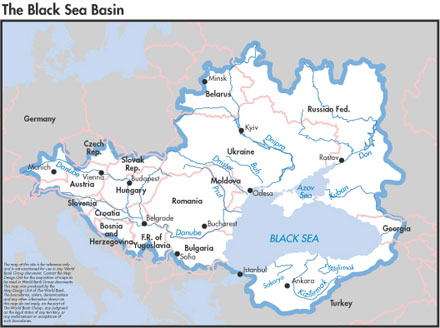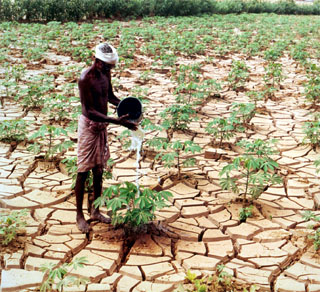Navigation
Managing Nutrients Presents Both Challenges and Solutions to Food Security
As global populations increase, a growing demand for food can be achieved through sustainable production and use of fertilizers which if not managed correctly will impact food security as well as water quality and availability, fisheries and biodiversity, says a report.
|
As global populations increase, a growing demand for food can be achieved through sustainable production and use of fertilizers which if not managed correctly will impact food security as well as water quality and availability, fisheries and biodiversity, says a report, "Building the Foundations for Sustainable Nutrient Management," launched by the United Nations Environment Programme (UNEP).
The food security of half of the world's population is dependent on the use of fertilizers but large amounts of fertilizers either escape into the atmosphere, or into groundwater, soil, rivers and coastal waters, creating an excess of nutrients in the environment, according to the report.
Nearly one billion people are affected by insufficient food production, a major factor being a shortage of the nutrients from fertilizers, i.e. nitrogen and phosphorous.
 |
| World Hypoxic and Eutrophic Areas Image courtesy of the Global Partnership on Nutrient Management |
The study notes that many of the world's freshwater lakes, streams and reservoirs suffer from eutrophication (excess nutrients) and millions of people depend on wells for their water where nitrate levels are well above recommended levels. In developing countries an estimated 90 per cent of wastewater, a major source of excess nutrients, harmful to health and ecosystems, is discharged as untreated into waterways and coastal areas, the study said. In the marine sector, nutrient over-enrichment has caused an increase in the frequency, scale and duration of oxygen depletion (hypoxic) or 'dead zones.'
The report with input from policymakers, scientists, the private sector, non-governmental organizations (NGOs) and UN agencies is a collaborative work with the Global Partnership on Nutrient Management (GPNM), incorporating the best practices and approaches in countries for managing nutrients and ensuring the benefits of food security.
The GPNM represents a coming together of government, policy makers, scientists, private sector, NGOs and UN agencies. It operates as a voluntary network of stakeholders, with a view to communicating the nutrient management challenge, and helping to building constituencies of interest and action among and in countries, agencies and donors around the goal of optimizing nutrient use, including problems of shortage, and reducing its impact. UNEP's Global Programme of Action coordination office based in Nairobi acts as the Secretariat to the Partnership.
"The problem of excess nutrients are expected to accelerate as the demand for food and bio-fuels increases and growing populations produce more wastewater but win-win situations are possible. Sustainable agricultural production is necessary, and so is protecting key ecosystem services," said David Osborn, Coordinator of UNEP's Global Programme of Action for the Protection of the Marine Environment from Land-based Activities (GPA).
The impact of excess nutrients is particularly felt in coastal zones which contain highly productive ecosystems as well as large urban centers. Some 60 per cent of the world's population lives and works within 60 kilometers of coastline where fishing is an important livelihood.
While there are enormous challenges, there are also viable solutions if nutrient management is incorporated into global policies and practices.
While the deltas have large amounts of nutrient inputs, the effective management of these nutrients can safeguard the contribution of agriculture and fisheries to food security and environmental protection, the report said.
Increasing the efficiency of fertilizer use, such as supplying fertilizer to the plant rather than the soil or using higher quality seeds and improved water management, could meet the projected 38 per cent increase in global cereal demand by 2025, reducing fertilizer use by about 15 million
tons of nitrogen per year.
The European Union has introduced the Nitrate Directive which sets discharge limits through regulations and stakeholder engagement, which has led to growing awareness in the farming industry about the importance of nutrient management leading to:
- Better nutrient management resulting in reduced inputs and increased efficiency in the agricultural sector;
- Increased application of agri-environmental schemes in rural development programs;
- Understanding that productive farming can go hand-in-hand with environmental protection through better management while keeping production at similar levels; and,
- Introduction of innovative agricultural practices resulting in improved nitrate management and significant overall savings by farmers.
"The challenge is not necessarily to create new approaches or technologies but improve on what we have for scaling up production and protecting the environment. These are the best practices that we incorporate into nutrient management and which must be mainstreamed into policy and practice," added Mr. Osborn.
 |
| The Black Sea Basin. Image courtesy of the Global Partnership on Nutrient Management |
The report uses the Black Sea Basin as an example of how trans-boundary cooperation among countries and UN agencies can promote effective nutrient management. The Sea, which has been degraded by massive pollution from over-fertilization and excessive nutrients, is now being rehabilitated through pollution control efforts, through a partnership project funded by the Global Environment Facility (GEF) and with the cooperation of UNEP, UNDP, the World Bank and basin countries.
Notes:
SCOPE
Almost four decades ago, the Scientific Committee on Problems of the Environment (SCOPE), launched a major program on the biogeochemical cycles of the main elements. Over the years, projects, often developed jointly with UNEP, focused on the study of carbon, nitrogen, sulphur and phosphorus as well as some of the trace elements (lead, cadmium, mercury and arsenic) and their effects on the food chain, resulting in 17 SCOPE monographs and a number of proceedings volumes. The Major Biogeochemical Cycles and Their Interactions has guided biogeochemical research since its publication in 1983. Interaction of the Major Biogeochemical Cycles: Global Change and Human Impacts revisited the issue twenty years later.
International Nitrogen Initiative
The International Nitrogen Initiative (INI) was established formally in 2003 to review the current understanding of the nitrogen cycle and to interact with decision makers and practioners in order to identify management options that optimize the use of nitrogen fertilizers while minimizing the negative effects of nitrogen on human health and the environment as a result of food and energy production. INI is a global network of scientists, created and sponsored by SCOPE and the International Geosphere-Biosphere Programme (IGBP), with regional centers in Europe,
North America, Latin America, Africa, South and East Asia. This GPNM foundation document underscores the INI foci on global and regional nitrogen (nutrient) assessments as an important catalyst in meeting the nutrient challenge and building policy support. The document was launched at the 5th International Nitrogen Conference (N2010) http://n2010.org/, organized by INI and its South Asia regional center, on 3-7 December 2010 in New Delhi, India.
UNEP
The United Nations Environment Programme (UNEP) is the voice for the environment in the UN system. Established in 1972, UNEP's mission is to provide leadership and encourage partnership in caring for the environment by inspiring, informing, and enabling nations and peoples to improve their quality of life without compromising that of future generations. UNEP is an
advocate, educator, catalyst and facilitator promoting the wise use of the planet's natural assets for sustainable development. It works with many partners, UN entities, international organizations, national governments, non-governmental organizations, business, industry, the media and civil society. UNEP's work involves providing support for: environmental
assessment and reporting; legal and institutional strengthening and environmental policy development; sustainable use and management of natural resources; integration of economic development and environmental protection; and promoting public participation in environmental management.
The news is from UNEP, 3 December 2010.
Search
Latest articles
Agriculture
- World Water Week: Healthy ecosystems essential to human health: from coronavirus to malnutrition Online session Wednesday 24 August 17:00-18:20
- World Water Week: Healthy ecosystems essential to human health: from coronavirus to malnutrition Online session Wednesday 24 August 17:00-18:20
Air Pollution
- "Water and Sanitation-Related Diseases and the Changing Environment: Challenges, Interventions, and Preventive Measures" Volume 2 Is Now Available
- Global Innovation Exchange Co-Created by Horizon International, USAID, Bill and Melinda Gates Foundation and Others
Biodiversity
- It is time for international mobilization against climate change
- World Water Week: Healthy ecosystems essential to human health: from coronavirus to malnutrition Online session Wednesday 24 August 17:00-18:20
Desertification
- World Water Week: Healthy ecosystems essential to human health: from coronavirus to malnutrition Online session Wednesday 24 August 17:00-18:20
- UN Food Systems Summit Receives Over 1,200 Ideas to Help Meet Sustainable Development Goals
Endangered Species
- Mangrove Action Project Collaborates to Restore and Preserve Mangrove Ecosystems
- Coral Research in Palau offers a “Glimmer of Hope”
Energy
- Global Innovation Exchange Co-Created by Horizon International, USAID, Bill and Melinda Gates Foundation and Others
- Wildlife Preservation in Southeast Nova Scotia
Exhibits
- Global Innovation Exchange Co-Created by Horizon International, USAID, Bill and Melinda Gates Foundation and Others
- Coral Reefs
Forests
- NASA Satellites Reveal Major Shifts in Global Freshwater Updated June 2020
- Global Innovation Exchange Co-Created by Horizon International, USAID, Bill and Melinda Gates Foundation and Others
Global Climate Change
- It is time for international mobilization against climate change
- It is time for international mobilization against climate change
Global Health
- World Water Week: Healthy ecosystems essential to human health: from coronavirus to malnutrition Online session Wednesday 24 August 17:00-18:20
- More than 400 schoolgirls, family and teachers rescued from Afghanistan by small coalition
Industry
- "Water and Sanitation-Related Diseases and the Changing Environment: Challenges, Interventions, and Preventive Measures" Volume 2 Is Now Available
- Global Innovation Exchange Co-Created by Horizon International, USAID, Bill and Melinda Gates Foundation and Others
Natural Disaster Relief
- STOP ATTACKS ON HEALTH CARE IN UKRAINE
- Global Innovation Exchange Co-Created by Horizon International, USAID, Bill and Melinda Gates Foundation and Others
News and Special Reports
- World Water Week: Healthy ecosystems essential to human health: from coronavirus to malnutrition Online session Wednesday 24 August 17:00-18:20
- STOP ATTACKS ON HEALTH CARE IN UKRAINE
Oceans, Coral Reefs
- World Water Week: Healthy ecosystems essential to human health: from coronavirus to malnutrition Online session Wednesday 24 August 17:00-18:20
- Mangrove Action Project Collaborates to Restore and Preserve Mangrove Ecosystems
Pollution
- Zakaria Ouedraogo of Burkina Faso Produces Film “Nzoue Fiyen: Water Not Drinkable”
- "Water and Sanitation-Related Diseases and the Changing Environment: Challenges, Interventions, and Preventive Measures" Volume 2 Is Now Available
Population
- "Water and Sanitation-Related Diseases and the Changing Environment: Challenges, Interventions, and Preventive Measures" Volume 2 Is Now Available
- "Water and Sanitation-Related Diseases and the Changing Environment: Challenges, Interventions, and Preventive Measures" Volume 2 Is Now Available
Public Health
- Honouring the visionary behind India’s sanitation revolution
- Honouring the visionary behind India’s sanitation revolution
Rivers
- World Water Week: Healthy ecosystems essential to human health: from coronavirus to malnutrition Online session Wednesday 24 August 17:00-18:20
- Mangrove Action Project Collaborates to Restore and Preserve Mangrove Ecosystems
Sanitation
- Honouring the visionary behind India’s sanitation revolution
- Honouring the visionary behind India’s sanitation revolution
Toxic Chemicals
- "Water and Sanitation-Related Diseases and the Changing Environment: Challenges, Interventions, and Preventive Measures" Volume 2 Is Now Available
- Actions to Prevent Polluted Drinking Water in the United States
Transportation
- "Water and Sanitation-Related Diseases and the Changing Environment: Challenges, Interventions, and Preventive Measures" Volume 2 Is Now Available
- Urbanization Provides Opportunities for Transition to a Green Economy, Says New Report
Waste Management
- Honouring the visionary behind India’s sanitation revolution
- Honouring the visionary behind India’s sanitation revolution
Water
- Honouring the visionary behind India’s sanitation revolution
- Honouring the visionary behind India’s sanitation revolution
Water and Sanitation
- Honouring the visionary behind India’s sanitation revolution
- Honouring the visionary behind India’s sanitation revolution


